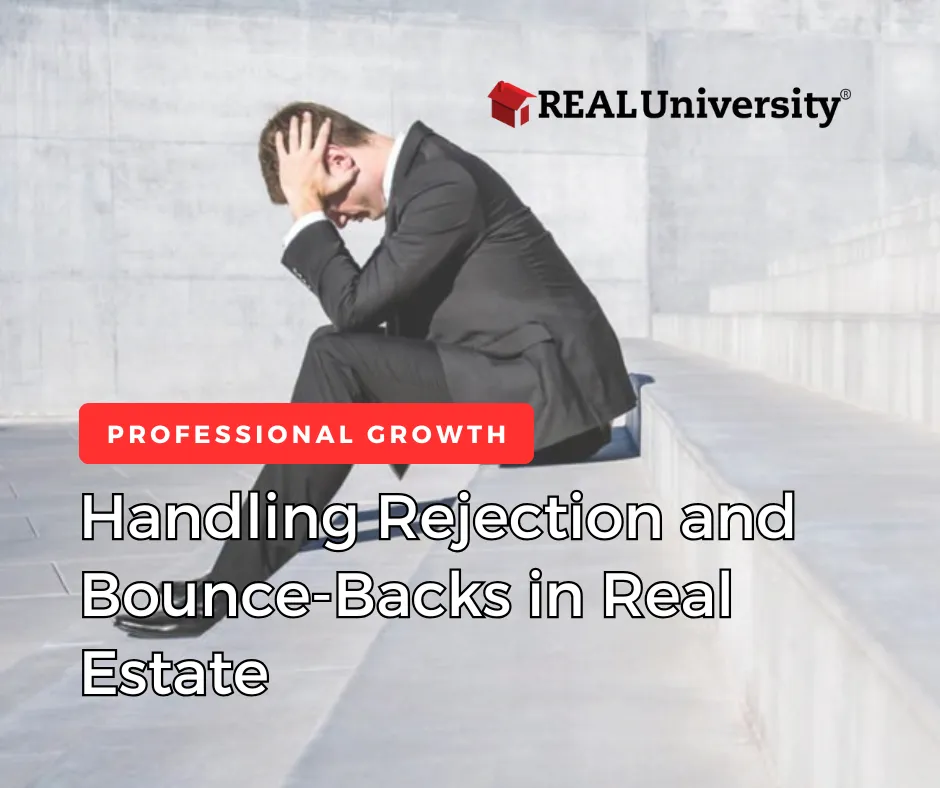Handling Rejection and Bounce-Backs in Real Estate

Entering the world of real estate means stepping into a career full of opportunities—and challenges. Every “yes” can change your life, but every “no” can test your confidence. The truth? Even the most successful real estate professionals face rejection regularly. The difference between thriving and burning out often comes down to how you handle those tough moments.
In this post, we’ll explore how to turn rejection into fuel for growth, bounce back stronger, and build long-term success in your real estate career.
🎯 Understanding That Rejection Is Part of the Business
Rejection isn’t personal—it’s professional. Whether it’s a client choosing another agent, an offer falling through, or a deal delayed, setbacks are part of the process. Real estate is a numbers game, but it’s also a relationship game. Not every interaction will end in a transaction, and that’s okay.
Every “no” moves you closer to a “yes.” It’s a reminder to refine your skills, adjust your approach, and continue showing up with confidence.
If you’re new to the field, our post “How to Get Your Real Estate License in Indiana: Step-by-Step Guide” is a great foundation to learn how preparation and mindset go hand in hand when entering the industry.
💡 Reframing Failure as Feedback
The most successful agents don’t see failure as defeat—they see it as data.
Did a client go with another agent? Maybe your communication cadence didn’t align with their expectations.
Did a lead go cold? It could be that your follow-up timing or messaging needs tweaking.
Each rejection reveals an insight that can help you improve. Reflect on what happened, take notes, and make small, intentional changes moving forward.
This growth mindset is a core part of professional development. If you’re looking for more ways to strengthen your confidence and business strategies, check out “What Top-Producing Agents Do Differently: Habits to Adopt Early in Your Career”.
💬 Don’t Take It Personally — Protect Your Mindset
It’s easy to internalize rejection, especially in the early days of your real estate career. But remember: a client’s decision usually has more to do with their circumstances than your abilities.
Here are a few mindset shifts that can help you stay grounded:
Detach from outcomes. Focus on effort, not results. You can’t control who says “yes,” but you can control how many people you connect with.
Keep perspective. A single “no” doesn’t define your success—it’s one moment in a long career.
Affirm your skills. Revisit client testimonials, positive feedback, or past wins to remind yourself of the value you bring.
If you’re struggling with confidence, our article “The Power of Consistency: Daily Habits That Lead to Real Estate Success” offers small, repeatable actions that build momentum and resilience.
🤝 Lean on Your Network for Support
Real estate can feel like a solo endeavor, but it doesn’t have to be. Your colleagues, mentors, and brokerage community can be powerful sources of encouragement and advice.
Reach out to peers who’ve experienced similar challenges. You’ll quickly discover that rejection is universal—even among top producers.
Consider joining mastermind groups or continuing education events where you can learn and connect with others. REAL University regularly hosts workshops and networking opportunities to help you grow personally and professionally.
If you’re looking for inspiration on expanding your professional relationships, read “How to Build Your Real Estate Network as a New Agent”.
🧭 Learn to Pivot and Adapt
Every rejection is a signal pointing you toward something that needs to evolve—your strategy, pitch, or even your target audience.
For example:
If you’re not landing listings, review your listing presentation materials.
If buyers aren’t converting, assess your communication style and response time.
If cold outreach feels ineffective, maybe it’s time to double down on referral marketing or video content.
Flexibility and adaptability are key traits of high-performing agents. For tips on how to stand out in competitive markets, explore “Personal Marketing 101: How to Stand Out in a Crowded Real Estate Market”.
📹 Use Rejection as Content Fuel
Here’s a creative way to turn challenges into opportunities: share your journey online.
Agents who are authentic about their wins and losses often build stronger trust with potential clients. Use your social media platforms to talk about what you’ve learned from difficult deals or what motivates you to keep going.
This transparency not only humanizes you—it positions you as a relatable expert who others can learn from. For guidance on building confidence in front of the camera, check out “Confidence on Camera: How Real Estate Agents Can Succeed with Video Marketing”.
💪 Develop Emotional Resilience
Bouncing back from rejection requires emotional strength and self-care. Here are a few ways to build it:
Set boundaries. Know when to disconnect from work and recharge.
Celebrate small wins. Progress matters, even if it’s not a sale.
Invest in yourself. Take continuing education classes, attend seminars, or read industry books that reignite your passion.
